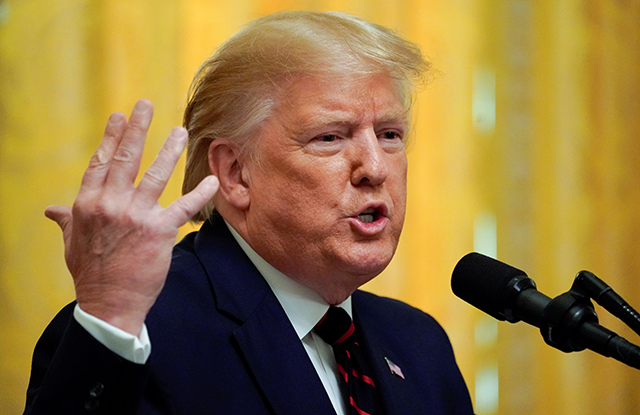Foreign interference is coming in the 2020 election whether Trump asks for it or not
Forget about China helping President Trump smear Joe Biden and his son. Or Ukraine doing so. Or any foreign country with reasonably sane leadership. Foreign interference in next year’s election, if it occurs, is likely to take a more familiar route.
Here’s one possibility: Several countries, each with a lot at stake and all using Russia’s 2016 hacking and disinformation playbook, line up on opposite sides of the election. North Korea and Saudi Arabia, for instance, might trying to help Trump get re-elected while Iran tries to help his opponent.
The Russians never really shut down, as Special Counsel Robert Mueller stressed in his testimony to Congress in July. China is highly capable, as well, and has a strong interest in who wins the election. Even if no one manages the 2020 equivalent of hacking the Democratic National Committee, they could sow doubt and disgust toward what’s already shaping up to be a very dirty campaign.
But it would be a huge risk for any country to help Trump dig up dirt on a rival. Trump once operated with impunity, but the whistle-blower complaint, subsequent investigation and impeachment inquiry, even though it’s still in its early stages, means there is no place to hide. If you were seen to be helping him, you would anger Democrats — and you’d be stuck with the consequences should they defeat Trump.
Ukraine, which still needs U.S. support against Russia, definitely doesn’t need this. And Trump’s theatrics this past week must look very strange to China’s cautious leadership, which dismissed his request to investigate the Bidens with a statement saying it trusted Americans to sort out their own problems.
Trump took a hit for his appeal to China, including from Republican Sens. Mitt Romney of Utah and Ben Sasse of Nebraska, and he fired back at Romney on Sunday. Trump also brought up the prospects of former vice president and another top Democratic contender, Sen. Elizabeth Warren, in a conversation with Chinese President Xi Jinping in summer, CNN reported.
It’s hard to believe Trump actually thought that China would investigate Biden on the basis of his very public appeal. Romney and Sasse probably reacted more to the idea than the possibility it actually would happen. Perhaps, as some commentators maintain, Trump is trying to inure Americans to talk of foreign involvement in U.S. elections. But repeatedly accusing Biden of massive corruption probably damages the former vice president. That, too, could be the point. Biden is already dealing with questions about how he responds to Trump, and his overall fitness for office.
If Trump does manage to drag Biden down, will he then turn on the next Democrat up with something equally dubious?
In the meantime, after Senate Majority Leader Mitch McConnell reversed his opposition, states are likely to get $250 million more in federal money to ensure election security. That doesn’t guarantee a foreign country won’t try to mess with the election process itself, but makes it somewhat less likely. It didn’t really happen in 2016 or 2018.
Instead, the action is likely to be where the Russians showed it could be done cheaply and effectively in 2016: through hacking and social media.
Mueller, of course, outlined Russian interference in the 2016 election and told Congress that Russia was “doing it as we sit here.” Last Friday, Microsoft reported that Iranian hackers had attempted to identify email accounts associated with government officials, journalists covering political campaigns and accounts associated with one of the 2020 campaigns.
Microsoft did not say which campaign had been targeted, but the New York Times quoted sources as saying it was Trump’s.
The Iranians weren’t particularly successful, but still it’s an indication of what may be to come. Darrell M. West, vice president of the Brookings Institution, says that while foreign efforts to influence U.S. elections are not new, “over the past few years, Russians have shown other nations how easy it is to sow disinformation and disrupt democratic elections.”
“Imagine a 2020 campaign where Russia, Saudi Arabia and North Korea engage in U.S. activities designed to re-elect Trump while China, Iran and others seek to undermine him,” West added. “Americans could wake up the day after the election not knowing whether they were manipulated into an election outcome by direct or indirect foreign activities.”
Each of these countries has cyber capabilities, and each has a lot riding on the election.
China has mostly sought industrial and commercial secrets, but its cyber teams are sharp enough to apparently have captured U.S. hacking tools in a National Security Agency attack, and repurposed them. North Korea has more typically engaged in hacking financial institutions, in what U.S. officials say is a campaign to finance its missile program. New U.S. sanctions were imposed last month. A spate of reports earlier this year said Saudi hackers had targeted the Guardian newspaper, a London-based Saudi dissident and the cell phone of Jeff Bezos.
The temptation will be great to at least quietly probe the campaigns, political parties and election systems, and try to seed beneficial stories into social media networks. That would be a lot safer and probably a lot more fruitful than answering a very public appeal from a president facing impeachment.








Gloss